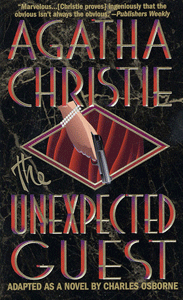Agatha Christie was more hit-and-miss with her plays than with her novels. In one of the hits, “The Unexpected Guest” (1958, novelized by Charles Osborne in 1999), she makes it look so easy that you’d wonder why she didn’t have more success.
A dark and foggy night
As with “Black Coffee” — adapted by Osborne one year prior – the novelization of “Unexpected Guest” simply takes the play and puts it into prose form. It’s totally recognizable as a two-act, single-room play (this room is shown with a helpful graphic), with no set changes and no substantial breaks in the narrative flow. Most chapters lead directly into the next.
The action takes place in the sitting room of Richard Warwick, a bitter wheelchair-bound man who spends his night with the French windows open, shooting at small animals. The titular Michael Starkwedder, having run his car off the road on this foggy Welsh night, enters through the French windows to find Warwick dead. Laura Warwick is in the corner with a gun, and admits to shooting her husband.

“The Unexpected Guest” (1999)
Author: Charles Osborne, based on Agatha Christie’s 1958 play
Genre: Mystery
Setting: Wales, 1958
Now is our chance to apply the puzzle-solving skills we’ve learned from reading Christie’s novels. It’s too easy to think Laura did it, despite her claim, so we look at the whole household of relatives and helpers. Christie tricked me, as she usually does, but I bet some people solved this one.
An expected suspect
(SPOILERS FOLLOW.)
About halfway through the book, I started thinking seriously about Jan, a mentally challenged 19-year-old. Like she’s waving a red handkerchief, Christie makes me think of “Of Mice and Men.”
Not understanding that it’s wrong to commit murder, Jan likely killed Richard, and Laura is likely protecting Jan with her confession. I also thought of Christie’s later novel – my review of which I’ll link to here – wherein someone who we wouldn’t usually put on a suspect list is the killer.
I was prepared to give “Unexpected Guest” a low rating for being a rare Christie story that’s so telegraphed that even I figured out whodunit. Not surprisingly (in retrospect), this turns out to be false telegraphing for the sake of tricking us.
Jan’s mental problems are enough to get him to brag about the murder, but not to have him actually be the murderer. This paves the way for Christie to unveil a couple more “This is what could’ve happened” scenarios, followed by the so-simple-it’s-brilliant revelation of the true killer.
(END OF SPOILERS.)
Christie’s plotting success came from the fact that she planned out several ways things could plausibly unfold. Playing the percentages, a reader/observer is likely to pick a scenario that’s not what actually happened, even though it could have. Therefore, Christie “wins” the game. “Unexpected Guest” is a valuable installment in her canon because it’s such a pure example of that game.

Keeping it simple for the stage
As for the non-puzzle elements, the characters are well-drawn and it’s eerie to imagine the Welsh fog encroaching on Richard’s sitting room. (I assume fog machines are used in the play to create mood.) On the negative side, Jan is very broad on the page, and not plausible as a real mentally challenged person – although a skilled actor could make him believable.
Thematically, “Unexpected Guest” doesn’t offer much, except for a quick passage where Michael contends that men are the sensitive gender and women are the pragmatic gender. Thus, paramour Julian is turned off by Laura when he suspects she is a killer. But Laura does not lose interest in Julian when she suspects he is the killer.
I believe there’s a basic truth in what Christie says here (although of course we must allow for individuals who don’t fit the commonalities of their gender).
Because of its straightforward one-room plotting, “The Unexpected Guest” can’t rank among the elite Christies as a novel. (Osborne does not attempt to flesh out her plays into true novels – and I don’t blame him for that decision.) But it would make for a fun outing at the theater.
Sleuthing Sunday reviews an Agatha Christie book or adaptation. Click here to visit our Agatha Christie Zone.

